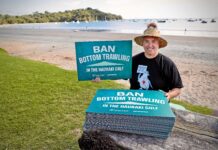Some things are a mystery in plain sight. It is, for example, ridiculous to demand more personal respect from the living person you have in front of you than you have yourself shown that person. If you have an abrasive personality, you might not cotton on to this for decades but you probably won’t be friends or liked as a colleague either.
It’s why I have so little respect for Auckland Council’s specious bureaucracy, going back to the ‘90s when a very senior official stood up at a public meeting, on ferries, I think, and announced he would ‘deal’ with my (professional) query. I said tartly that I didn’t want to be dealt with, but a specific answer. The same high level official is still there, dealing in council property.
We have lost our Waiheke board’s Belgium Street Service Centre since the last local government election and the cardboard polling boxes that popped up at the Aussie-owned supermarket was hardly dignified or respectful. For the city to package low voter polling numbers in last Saturday’s one-in-five voting statistics as satisfaction with our sclerotic city is specious, even for them.
We know too much and can do so little with this monster and the opposite is true. Exhausted citizens can be forgiven for their despair.
Early on during the voting on Saturday, Waiheke Island, Rodney (Warkworth), Great Barrier and Franklin (Waiuku) were voting in force, precisely because we are under existential threat. All are rural, which the supercity has never understood apart from development opportunities, and these districts and islands are all uniquely connected to the land, their enviable coasts capes and their surrounding waters. In significant comparison to urban or suburban life, no disrespect.
They have all had strong community newspapers, too, this year notably expunged from any Auckland Council election advertising spend. The entire election advertising placed with us at Gulf News ran to a single quarter-page advertisement though our coverage of candidates and their views on current issues ran well into 40 plus pages over the campaign period, including stories on how and where to vote when it became clear the council was not planning to advertise this to our community themselves.
So we out on the skinny branches definitely aren’t disarmed and disenfranchised by satisfaction and, judging by the grey pall over city life, low voting is pretty much down to council’s stifling management of ‘customer engagement’, the grimness of survival in a neglected, transport-wracked metropolis and despair at a self-excusing financial tangle of managerial mumbo jumbo and crippling rates bills.
It’s interesting that Waiheke and Rodney are also areas which have, over the 36 years of the two supercity models, made four strong bids for breaking away and claiming the long-promised subsidisation that would devolve a respectful amount of grassroots governance and a commensurate share of their own rates to get up to speed with infrastructure.
The first was early in the ‘90s and coincided with a council rates rebate for undelivered services collected in error, the second a damning Royal Commission on Auckland Governance between 2007 and 2009 that led to the second (and worse) Act Party supercity model, and the third an extensive and excellent Local Government Commission consultation in late 2017.
The last was in the time of the island’s outgoing local board when we had a useful pilot scheme which the council’s own peer reviewers rated highly for its design but had actually achieved very little except a better relationship between board and officials.
Each breakaway attempt was torpedoed at the last moment, mostly by political interference.
While we wait for the final count from Saturday’s election, we would like to thank all the candidates for their help in canvassing local issues and sharing their intentions with ratepayers and residents and we wish them well in negotiating the coming interregnum with their own goals for the next three years in mind.
There will undoubtedly be an induction period where officials lay out the rules of the game. During the term of the previous board, it included an extraordinary piece of official advice proposing the establishment of multiple closed workshop meetings, officials blandly saying it was essential if the board wanted to know the candid side of official plans in advance. It would also shut down dissenting voices and troublemakers, it said.
Between that and a blitz of planning documents, a huge backlog has built up. The re-prioritising of housing, the hollowing out of families being priced off the island, damaging housing strategies, the unregulated ferry fares and their impact on businesses, advocacy on unfair pricing, our chimeric swimming pool, monopoly tourism aspirations and the high cost of council-controlled public halls, annual events and even basic celebrations. It doesn’t have to be like this.
The best committee I ever worked on was the board of Te Huruhi Primary School during both the vitriolic high school uniform issue and the logistics of splitting up the former area school. If any of us on the junior school board showed a sign of bringing the outer conflict to the future junior school, our chairwoman came out with the talismanic phrase: “Is that in the best interests of the pupils?”. Collaboration was immediately re-established round the table and work resumed without gossip or rancour.
Great things can be achieved if we get back to respect and a certain lightness of being that isn’t always grasping at something.
• Liz Waters
© Waiheke Gulf News Ltd 2025





